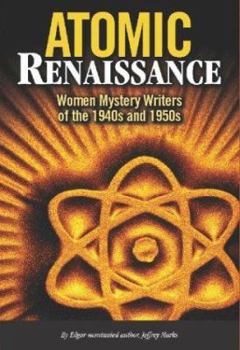Atomic Renaissance: Women Mystery Writers of the 1940s and 1950s
Select Format
Select Condition 
Book Overview
America in the 1950s was a place of Eisenhower, the Korean Conflict, McCarthy, and Sputnik. Women found themselves trapped into a mold of Donna Reed and June Cleaver, marginalized by the... This description may be from another edition of this product.
Format:Hardcover
Language:English
ISBN:0966339770
ISBN13:9780966339772
Release Date:September 2003
Publisher:Delphi Books
Length:172 Pages
Weight:1.00 lbs.
Dimensions:0.8" x 6.0" x 9.5"
Customer Reviews
1 rating
This Guy Knows His Stuff!
Published by Thriftbooks.com User , 17 years ago
Jeffrey Marks' thesis might have been developed a little bit more, but in general you get the feeling his instincts are wholly on target, and that the explosion of the atom bomb is a potent analogue for the explosion of female thriller talent around the time of Second World War. Though several, in fact nearly all, of his seven chosen subjects began writing somewhat earlier. However, the seven women are so distinctive that I have trouble finding enough similarities to each other to prove any point one way or the other. Marks, whose biography of Craig Rice is one of the shining achievements of biography within the past 15 years, has worked up his research into a solid grab bag of amusing profiles, and he respects his readers enough to leave us wanting more, for each of the writers he surveys deserves a full length "life of her own." He admits defeat in a few cases, and we never really get to know either Leslie Ford nor Phoebe Atwood Taylor very well--there just doesn't seem to be much of an "in" in either case. Readers have long wondered why Atwood Taylor abandoned writing right at the peak of her career and, even though she lived another 20 plus years, never touched a pen after her middle-aged marriage. Was she just tired of writing? Did she give up her career to please her husband? Did her husband provide her with enough money so she did not need to continue? Marks doesn't really know and neither do we. With Dorothy Hughes, and a similar career twist, Marks is on firmer ground--the demands of her family, and a subtle sort of "graylisting" connected to her left wing political affiliations, prevented her from writing fiction for years at a stretch. Patricia Highsmith and Mignon Eberhart have both been written about at full length by rival biographers, of course, but Marks is able to give their familiar--and very sad--stories a new angle or two. (Rick Cypert's biography is persuasive in its reading of Eberhart as an American modernist, like Gertrude Stein, while Marks takes up the postwar, post-modernist innovator with equal aplomb.) The two most talented writers he surveys (in my own opinion, of course, for many would cite Highsmith as the best) are Margaret Millar and Charlotte Armstrong, both shamefully underrated elsewhere. Marks treats Millar as the tragic figure she was--nearly a Medea in her devotion to her husband, and an enigma to her suffering daughter. Marks could have even upped the tragedy angle if he had written about the Eudora Welty-Ross Macdonald-Millar triangle, in which Macdonald's and Welty's different biographers have uniformly cast her as the villain. This was Marks' chance to let us see the affair from her own point of view. But, we get enough skilled literary criticism to forgive him this one omission. As for Armstrong, she of all US novelists deserves her own biography--indeed she should have gotten the Nobel Prize--or perhaps that's too strong. Who else would you have included in this book? For me, I hav





